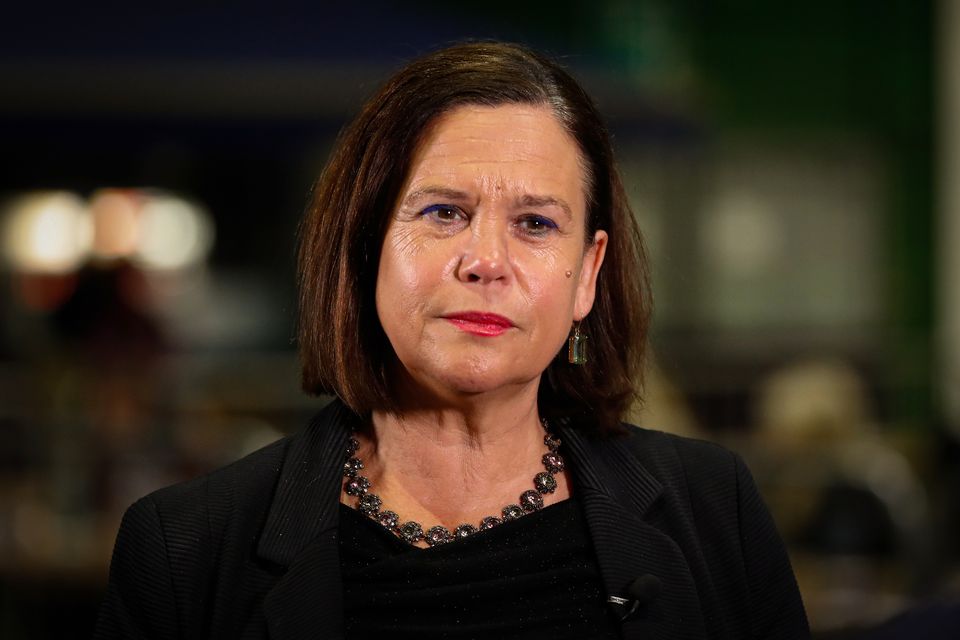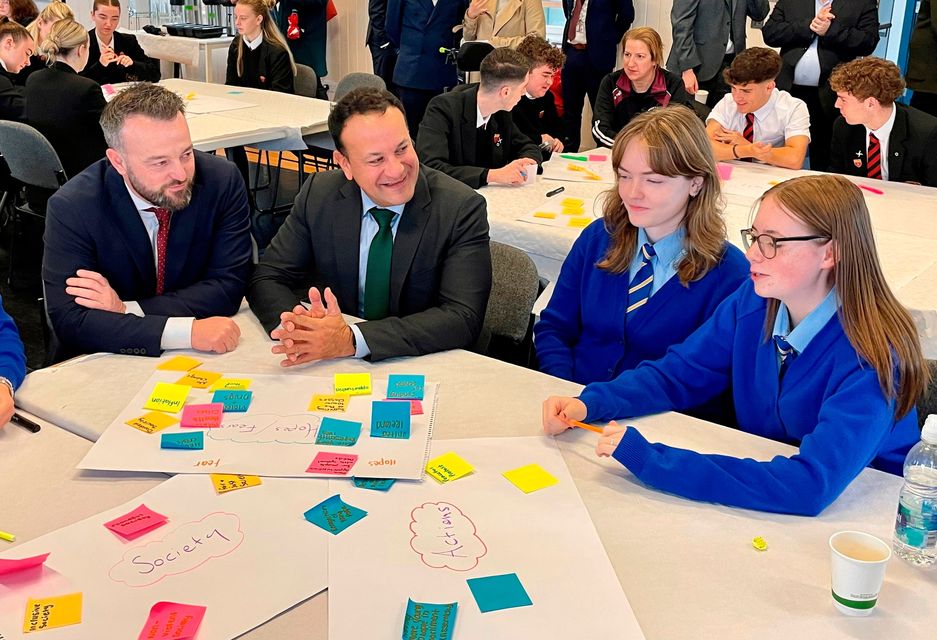Sinn Fein leader Mary Lou McDonald has described comments made by the former taoiseach as him finding his “inner Shinner”, after Leo Varadkar said every party should make manifesto pledges that Irish reunification is an “objective, not an aspiration”.
The former Fine Gael leader called for politicians in the Republic to back the establishment of a forum to set out plans for Irish unity.
He made the comments in an interview with the Irish Times ahead of his appearance at the SDLP’s New Ireland Commission.
Asked about his comments on Thursday morning, Ms McDonald said they were welcome but “belated”.
“I’m glad that he’s exited the position of taoiseach, that he’s found his inner Shinner and his appetite for reunification,” the Dublin TD said.
Sinn Fein leader Mary Lou McDonald (Damien Storan/PA)
“This is where every political party should be. This is the big opportunity for our island to consolidate peace, to finally reach a point of reconciliation, and to benefit from the huge economic and social and political opportunity that will present to us.
“To us, this is a no-brainer. Of course, it has to be more than rhetoric. A soundbite is not enough.
“Those that are committed to reunification recognise there has to be a citizen’s assembly, a structured democratic conversation.
“There has to be commitment to the holding of referendums. That’s really the issue here.
“If you believe that we support and enforce all of the Good Friday Agreement, well then you have to have a commitment to the holding of referendums.
“That’s the point at which the people have their say.
“I very much hope that every single political party will make clear-cut commitments on this regard, not just to move from an aspiration to an objective, but rather to move from an objective to an active plan of action.
“I hope that will be the case for Fine Gael. I wonder, will the taoiseach now make absolutely clear that the position of Fine Gael is now finally to recognise the need for referendums, the need for planning.”
Read more
Ms McDonald’s comments were put to Mr Varadkar during the event in Derry as he was asked why he was being more outspoken on the issue of unification since he had stood down as taoiseach.
“One of the advantages of not being involved in electoral politics now is I’m more free to say what I think and do what I think is right,” he said.
“Whereas you know, when you’re taoiseach, when you’re a leader of a political party, you have to think about how your party’s going to react, how your coalition partner is going to react, how the media might interpret it, how it might be heard in London, for example.
“And, look, I’m less concerned about those things. Constraints come with office, and you accept them, but when you don’t hold office anymore, you don’t have the same level of constraints.”
Speaking at the Sinn Fein alternative budget launch, Mayo TD Rose Conway-Walsh also welcomed Mr Varadkar’s comments.
“But it needs to mean much more than that,” she added.
“He was taoiseach and he should have been planning. I think it’s absolutely reckless for any government not to be planning for reunification at this stage.
“Obviously, Sinn Fein believes that citizens have the right to national self-determination.
“Currently, we’re living on a partitioned island, and that is costing us dearly.
“Addressing this by achieving Irish unity through the referendums included within the Good Friday Agreement is and always has been a Sinn Fein priority.
“A new and united Ireland with citizens rights as its core is what we seek to deliver. The Irish Government has a constitutional obligation to pursue and to prepare for unity.”
SDLP leader Colum Eastwood (left) and former taoiseach Leo Varadkar (second left) talking to schoolchildren during an event at Derry’s Playhouse theatre hosted by the SDLP’s New Ireland Commission exploring youth perspectives on the constitutional future of the island of Ireland. Image: David Young/PA Wire
At the Derry event, Mr Varadkar also proposed a two-stage referendum process for a potential future vote on the reunification of Ireland.
Mr Varadkar suggested an initial vote where people on both sides of the border would decide whether they agree “in principle” with constitutional change, and then a final “confirmatory” ballot once the structures and constitution of the new political entity were designed and presented to the public.
Under the terms of Good Friday peace agreement of 1998, the UK Government is obliged to call a referendum in Northern Ireland if there is evidence of a shift in public opinion in favour of unity. In that event, there would be a simultaneous vote in the Republic of Ireland.
The peace accord does not currently envisage a two-stage process as suggested by former Fine Gael leader Mr Varadkar.
Mr Varadkar suggested the Irish parliament could sit at Stormont in Belfast for parts of the year in the event of unification.
He also proposed that the unified state could have a president and vice-president, one of whom would be from the unionist/British tradition.
The former premier said a unified Ireland would also need to strike international defence agreements and partnerships in order to protect its seas and airspace.
In regard to his proposed two-stage referendum, Mr Varadkar acknowledged that it could prove controversial.
“One idea that I’ve suggested, and it might be a terrible idea, but I think it’s worth thinking about is a two-stage process, one where people vote on the idea in principle, then we have a convention that works out the details and the new constitution, and people get to do a confirmatory vote,” he said.
“A lot of people think that’s a bad idea, because they want the clear question first, but it’s not one that I think should be thrown out. It’s something I think should be thought about.
“And I’m conscious that the new prime minister, Keir Starmer, actually advocated this approach in relation to Brexit, called for a second vote on the deal. So it’s not an entirely crazy idea, and one that’s been suggested before.”
While schools from across Derry were invited to Thursday’s event at the city’s Playhouse, only schools from the Catholic education sector attended.
Mr Varadkar acknowledged that many unionists and loyalists do not wish to engage in discussions about Irish unification.
He said he would take a similar stance if asked to consider the Republic of Ireland re-joining the UK.
But he said a yes vote in the initial “in principle” ballot might persuade sceptics to get involved in the process of designing the new state.
“There are people who are very strong and avowed unionists who will never want to have this conversation, just as I wouldn’t want to engage in a conversation about the Republic of Ireland joining the United Kingdom, I wouldn’t be interested in that, so that is a real difficulty for us,” he said.
“But I do think there are people who come from a Protestant background, or come from a Protestant/unionist/loyalist background who don’t necessarily vote for the unionist parties anymore, who might be interested in engaging.
“They might vote Alliance, they might vote SDLP or Green, or they might not vote at all.
“So I do think there are people, and I’ve met them, who are interested in having this conversation, and they’re coming from a background that traditionally would be Protestant or unionist, but it is one of the ideas why I think there is some merit in considering a two-stage referendum, because if we had the first stage and people north and south voted for unification in principle, I think you might then get a larger number who would accept the democratic outcome, and then might be willing to engage in the co-design of what that new Ireland looks like.”
Mr Varadkar said the concept of “accommodating” people from a British identity in a new Ireland did not go far enough.
“It’s really important that we don’t just try to accommodate them in a new Ireland, but that we try and design the new Ireland with them, so that’s their home too,” he said.
“Somebody said to me once that they really don’t like the word ‘accommodation’, because accommodation, it’s like a hotel, or it’s a B&B, it’s somewhere where you get to stay, but it’s not really your home.
“And what we have to do to make sure a united Ireland works is to make sure that we co-design this, at least with those who are willing to talk to us about it, and we make accommodations or make changes and concessions that I think would work.”
Mr Varadkar said while he felt that unity would be achieved in the coming decades, he cautioned it was by no means certain.
He said that was why preparation was vital, as he warned that a no vote in any referenda would knock the issue “off the agenda for a long time”.
The ex-Fine Gael leader said unification was becoming a more attractive prospect for a variety of factors.
He said the opportunity of Northern Ireland re-joining the EU through unification was one pull factor.
Mr Varadkar also said the economy, health service, childcare support and welfare system were all in a better state in the Republic of Ireland than in Northern Ireland.
“So I think we’re in a very different place than we were 100 years ago, or 50 years ago, or even 20 years ago,” he said.
“The case for unification and the arguments for unification are a lot stronger than they were then, because of the things that have changed.”

